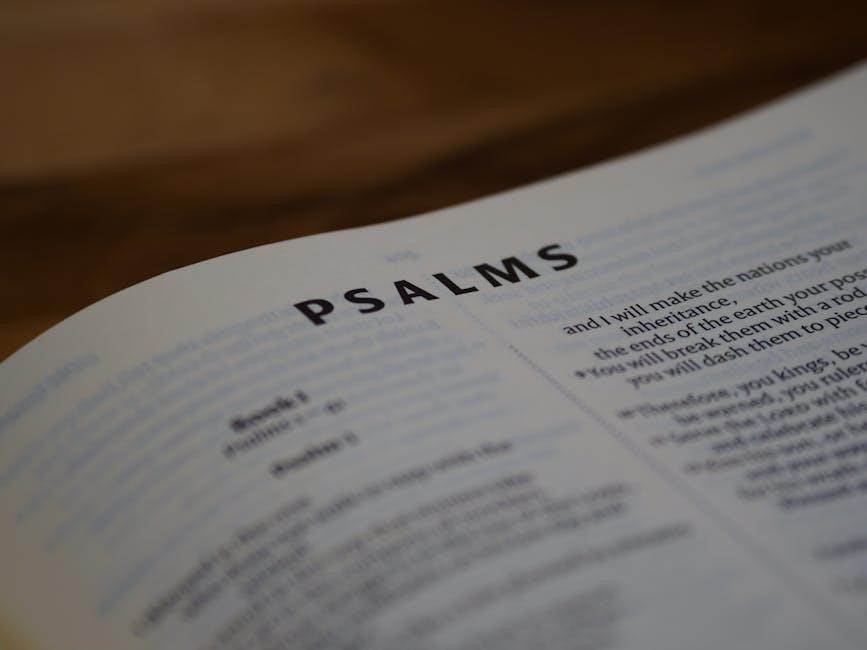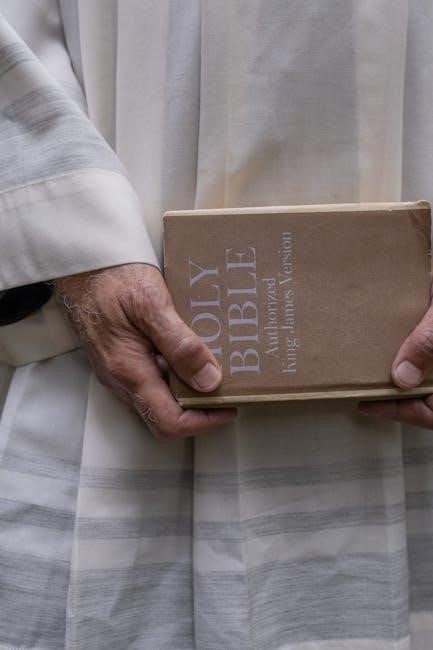oedipus the king book pdf
Category : PDF
Oedipus the King, a timeless Greek tragedy by Sophocles, explores themes of fate, free will, and truth․ Its PDF version offers modern readers convenient access to this classic tale․
1․1 Overview of the Play
Oedipus the King, a tragic masterpiece by Sophocles, revolves around King Oedipus of Thebes and his quest to save his city from a deadly plague․ The play unfolds as Oedipus uncovers a prophecy that foretells his downfall, leading to the shocking revelation of his true identity․ This gripping narrative explores themes of fate, truth, and human suffering, making it a cornerstone of Greek tragedy․ Its PDF version is widely available, offering modern readers access to this timeless story․
1․2 Importance of the PDF Version
The PDF version of Oedipus the King offers a convenient and accessible way to engage with Sophocles’ timeless tragedy․ It preserves the original text’s integrity while allowing modern readers to easily navigate and study the play․ Free and widely available, the PDF format ensures that this classic work remains accessible to a global audience, fostering education and appreciation of Greek tragedy in the digital age․
1․3 Key Themes Explored in the Play
Oedipus the King delves into profound themes such as fate versus free will, blindness and sight, and the consequences of truth․ Through Oedipus’s tragic journey, Sophocles examines the inevitability of destiny and the human condition’s complexities․ These themes resonate universally, making the play a cornerstone of literary exploration and philosophical debate, as highlighted in its PDF versions available for modern readers․

The Author: Sophocles
Sophocles, a renowned Athenian tragedian, was born in 495 BC and died in 405 BC․ He wrote over 120 plays, with only seven surviving, including Oedipus the King․
2․1 Background and Contributions to Greek Tragedy
Sophocles was a prominent Athenian tragedian of the 5th century BC, known for his significant contributions to Greek drama․ He introduced the third actor and complex choruses, revolutionizing the structure of tragedy․ His works, such as Oedipus the King, showcased deep emotional depth and moral complexity, solidifying his reputation as one of the greatest tragedians․ His plays remain foundational in the study of classical literature and continue to influence modern theater․
2․2 The Historical Context of “Oedipus the King”
Oedipus the King was written around 420 BC, during the Golden Age of Athens․ It reflects the cultural and philosophical ideals of ancient Greece, exploring themes of fate, morality, and human suffering․ The play is part of the Theban trilogy, which includes Oedipus at Colonus and Antigone․ Its historical significance lies in its portrayal of tragic heroism and the inevitable consequences of divine prophecy, resonating with audiences for centuries․

Plot Summary
Oedipus the King tells the tragic story of Oedipus, who unknowingly fulfills a prophecy by killing his father and marrying his mother, leading to his downfall and self-blinding․
3․1 The Prophecy and Its Impact
The oracle’s prophecy to Laius and Jocasta foretold that their son would kill his father and marry his mother, driving the tragic events of the play․
Oedipus’s abandonment and adoption set in motion the fulfillment of the prophecy, creating a cycle of fate that he unknowingly cannot escape, shaping the play’s tragic outcome․
3․2 The Discovery of Oedipus’s True Identity
Oedipus’s true identity is revealed through a series of tragic events and revelations, exposing that he is the son of Laius and Jocasta, fulfilling the prophecy․
The messenger from Corinth and the shepherd’s testimony confirm his origin, leading to Jocasta’s suicide and Oedipus’s self-blinding, marking the play’s devastating climax and the irreversible consequences of his discovery․

Major Themes
Fate vs․ free will, blindness and sight, and truth and its consequences are central themes, exploring the inevitability of destiny and the human struggle against it․
4․1 Fate vs․ Free Will
The play explores the tension between fate and personal choice, as Oedipus’s efforts to evade a prophecy ultimately lead to its fulfillment․ The oracle’s prediction creates a paradox, suggesting that fate is inescapable, while Oedipus’s actions imply a struggle for control․ This interplay highlights the tragedy of human agency against divine will, raising questions about the limits of free will in a world governed by destiny․
4․2 Blindness and Sight
The play uses physical and metaphorical blindness to explore truth and ignorance․ Oedipus, sighted yet unaware of his true identity, contrasts with Tiresias, the blind prophet who sees the truth․ This duality underscores the theme that physical sight does not guarantee understanding, while inner blindness can prevent one from perceiving reality․ The interplay of light and darkness symbolizes the tragic collision of knowledge and ignorance in Oedipus’s doomed quest for clarity․
4․3 Truth and Its Consequences
The play delves into the destructive power of truth, as Oedipus’s relentless pursuit of it unveils his tragic identity․ The prophecy that he would kill his father and marry his mother becomes reality, leading to devastating consequences․ Jocasta’s death and Oedipus’s self-blinding illustrate the irreparable damage caused by uncovering hidden truths․ This theme underscores the inevitability of fate and the human struggle to accept uncomfortable realities, making the PDF version of the play a vital resource for exploring these profound ideas․

Key Characters
The central characters in Oedipus the King include Oedipus, the tragic hero; Jocasta, the queen; Creon, her brother; Tiresias, the blind prophet; and the Chorus, representing the people of Thebes․
5․1 Oedipus: The Tragic Hero
Oedipus, the king of Thebes, is a complex figure embodying both noble and flawed traits․ His tragic downfall stems from a prophecy he unknowingly fulfills, highlighting the tension between fate and free will․ As a wise leader, he solves the Sphinx’s riddle, saving Thebes, but his hubris and determination to uncover the truth lead to devastating consequences․ His story, marked by ignorance of his true identity, becomes a timeless exploration of human suffering and the inevitability of destiny․
5․2 Jocasta: The Queen of Thebes
Jocasta, the queen of Thebes and Oedipus’s mother, plays a pivotal role in the tragedy․ Her life is marked by a doomed prophecy and a desperate attempt to prevent its fulfillment․ She marries Oedipus unknowingly, creating a tragic familial bond․ When the truth surfaces, her inability to accept it leads to her suicide, symbolizing the devastating consequences of fate and the collapse of her royal family․ Her death profoundly affects Oedipus, deepening his anguish and regret․
5․3 Creon: The Brother of Jocasta
Creon, Jocasta’s brother, is a significant figure in Thebes, known for his loyalty and political ambition․ He plays a crucial role in the story, often acting as a mediator and advisor to Oedipus․ Creon’s cautious nature and adherence to the oracle’s instructions highlight his commitment to justice․ His interactions with Oedipus reveal tension, as Creon defends himself against accusations, showcasing his complexity․ In the PDF version of the play, Creon’s character is well-documented, emphasizing his role in Theban politics and family dynamics․
5․4 Tiresias: The Blind Prophet
Tiresias, the blind prophet, holds significant wisdom despite his physical limitation․ His knowledge of the divine truth makes him a pivotal figure in unraveling Oedipus’s fate․ Tiresias’s revelation about Oedipus’s identity sparks the tragic events, showcasing his role as a catalyst for truth․ His blindness symbolizes the theme of sight versus insight, as he “sees” what others cannot․ In the PDF version of the play, Tiresias’s dialogue and interactions are crucial for understanding the prophecy’s fulfillment․
5;5 The Chorus: The Voice of the People
The Chorus in Oedipus the King represents the collective voice of Thebes, offering emotional and moral commentary․ Their songs and dialogues provide insight into the community’s feelings and the unfolding tragedy․ The Chorus bridges the gap between the audience and the characters, emphasizing themes like fate and justice․ In the PDF version, their role remains vital, enriching the narrative with their reflections and connecting modern readers to the ancient story’s timeless essence․

The Historical Context of the Play
Oedipus the King, written around 420 BC, reflects Sophocles’ exploration of fate, justice, and human suffering․ The play is deeply rooted in Athenian culture and mythology, offering insights into ancient beliefs about prophecy and divine intervention․ The PDF version preserves these historical elements, making the play accessible to modern readers while maintaining its original intellectual and emotional depth․
6․1 The Theban Plays and Their Significance
The Theban Plays, comprising Oedipus the King, Oedipus at Colonus, and Antigone, chronicle the tragic fate of the Labdacus dynasty․ These works explore themes of divine justice, human suffering, and moral dilemmas, providing profound insights into Athenian culture and philosophy․ The PDF versions of these plays offer modern readers a convenient way to engage with Sophocles’ masterpieces, preserving their historical and literary significance for contemporary study and appreciation․
6․2 The Role of the Oracle in Ancient Greece
In ancient Greece, oracles served as divine intermediaries, providing guidance and prophecies․ In Oedipus the King, the oracle’s prophecy drives the plot, foretelling Oedipus’s tragic fate․ Its authority was revered, yet its truths often brought devastating consequences, as seen in Oedipus’s relentless pursuit of knowledge․ The oracle’s role underscores the tension between divine will and human agency, a central theme in Sophocles’ work, and its influence remains a cornerstone of Greek tragedy and cultural heritage․

Symbolism in “Oedipus the King”
Symbolism in Oedipus the King includes the Sphinx, representing mystery, and Oedipus’s blindness, symbolizing tragic ignorance․ These elements highlight themes of fate and truth․
7․1 The Sphinx and Its Riddle
The Sphinx, a mythical creature, poses a riddle to the people of Thebes, symbolizing the mystery and chaos that Oedipus must solve to save his kingdom․ By answering the riddle, Oedipus demonstrates his intellectual prowess, but it also sets the stage for his tragic downfall, as the Sphinx’s challenge serves as a precursor to the prophecy that defines his fate․ The Sphinx’s presence underscores the themes of knowledge, power, and inevitable destiny in the play․
7․2 The Blindness of Oedipus
Oedipus’s physical blindness, inflicted as a punishment for his actions, serves as a powerful symbol of his metaphorical blindness to the truth throughout the play․ His inability to see the reality of his past and identity underscores the tragic irony of his situation․ The PDF version of the play highlights this duality, emphasizing how Oedipus’s blindness represents the human condition’s struggle with knowledge, fate, and self-awareness, making it a central theme in the tragedy․

Comparative Analysis
This section compares Oedipus the King with other works like Antigone and explores its influence on later literature, offering insights through its PDF version․
8․1 “Oedipus the King” vs․ “Antigone”
Both Oedipus the King and Antigone explore themes of fate, family curses, and moral dilemmas․ While Oedipus focuses on a king’s tragic downfall due to prophecy, Antigone highlights a heroine’s defiance against unjust laws․ Both plays, available in PDF, showcase Sophocles’ mastery of tragic drama, with Oedipus emphasizing inevitability and Antigone stressing individual conscience․ Their PDF versions provide modern readers with accessible ways to study these timeless works․
8․2 The Influence of “Oedipus the King” on Later Literature
Oedipus the King has profoundly influenced Western literature, shaping themes of fate, free will, and tragic heroism․ Its exploration of human suffering and moral dilemmas inspired countless works, from Shakespearean tragedies to modern dramas․ The play’s psychological depth and dramatic structure continue to be studied and emulated․ Its PDF availability ensures easy access for scholars and readers, preserving its legacy as a foundational text in literary history․ Its impact endures across genres and eras․

Downloading the PDF
The PDF version of Oedipus the King is widely available online, offering readers a convenient and free way to access this timeless classic․ Reliable sources like Project Gutenberg provide easy downloads, ensuring the play’s themes and legacy remain accessible to modern audiences․
9․1 Reliable Sources for the PDF Version
Reputable platforms like Project Gutenberg and ManyBooks offer free PDF downloads of Oedipus the King․ These sites ensure high-quality, copyright-free versions, making the tragedy accessible to global readers․ Additionally, academic repositories and digital libraries provide verified PDF copies, maintaining the integrity of Sophocles’ original work for educational and personal use․
9․2 Free Resources and Their Availability
Oedipus the King is widely available as a free PDF from sources like Project Gutenberg and ManyBooks․ These platforms provide free downloads without registration, ensuring easy access for readers worldwide․ Additionally, public domain editions are accessible through various digital libraries, making Sophocles’ masterpiece readily available for educational and personal enrichment․

Study Guide and Resources
A comprehensive study guide for Oedipus the King is available for free download, offering in-depth analysis and discussion topics to enhance understanding of the play․
10․1 Analysis of Key Scenes
The PDF version of Oedipus the King includes detailed analyses of pivotal scenes, such as Oedipus’s discovery of his true identity and the tragic confrontation with Jocasta․ These analyses provide insights into the emotional depth and thematic significance of each moment, helping readers better understand the play’s complex narrative and character development․ The guide also explores the role of the blind prophet Tiresias and the dramatic irony that underscores the tragedy, enriching the reader’s comprehension of Sophocles’ masterpiece․
10․2 Discussion Questions and Essay Topics
The PDF version of Oedipus the King includes thought-provoking discussion questions and essay topics, encouraging readers to explore themes like fate vs․ free will and the consequences of truth․ Essay prompts might include analyzing Oedipus’s decisions, the role of the chorus, and the impact of the prophecy․ These resources help deepen understanding of the play’s complexities and its timeless relevance in literature and philosophy, making it an invaluable study aid for students and scholars alike․
Oedipus the King remains a profound exploration of human destiny and truth․ Its PDF format ensures timeless accessibility, offering modern readers a seamless way to engage with Sophocles’ masterpiece․
11․1 The Lasting Impact of “Oedipus the King”
Oedipus the King remains a cornerstone of Western literature, its themes of fate, free will, and truth continuing to resonate․ The play’s exploration of human frailty and divine prophecy has influenced countless works, from Shakespeare to modern psychology․ Its timeless relevance is further enhanced by its availability in PDF, ensuring that Sophocles’ masterpiece reaches new generations, preserving its legacy as a profound study of human nature and destiny․
11․2 The Value of the PDF Format for Modern Readers
The PDF format of Oedipus the King offers modern readers unparalleled convenience and accessibility․ Available for free download from reputable sources like Project Gutenberg, the PDF preserves the play’s original intent while allowing readers to engage with the text digitally․ This format ensures that Sophocles’ timeless tragedy remains accessible, enabling readers to explore its profound themes and historical significance with ease, regardless of their location or device․
